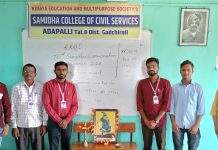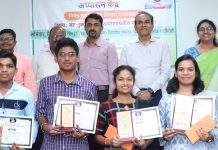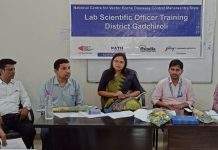
Gadchiroli Dec. 26 (District Correspondent) A 3-day workshop on the topic ‘How to eliminate Malaria from Gadchiroli district’ was organized recently at SEARCH headquarters to understand the current situation and to discuss the strategies to eliminate malaria.
Dr. Abhay Bang, Director of SEARCH, with his team consisting of Dr. Supriyalaxmi Totiger, Dr. Anand Bang, Mr. Mahesh Deshmukh, Dr. Sanjay Baitule, Senior Scientists from NIMR Dr. Neelima Mishra, Dr. Himmat Singh and Dr. Kuldeep Singh, and Dr. Dawal Salwe, District Health Officer, Dr. Lokesh Kotwar, District Malaria Officer, Dr. Kunal Modak, Medical Officer of PHC Godalwahi and their team took part in this workshop.
1.8 lakh malaria cases were reported in 2022 in the country, of which 80% of cases were from areas consisting of 20% of the population residing in tribal, hilly, and inaccessible areas. This constitutes 25 districts in India. To achieve the national goal of eliminating malaria by 2030, special attention is needed on these high-burden districts. Gadchiroli is one of the six districts that have the highest malaria burden, it was informed.
A collaborative initiative between the Society for Education, Action, and Research in Community Health [SEARCH], an NGO working on the tribal health issues in the Gadchiroli district, ICMR’s National Institute of Malaria Research [NIMR] and District Health Department, Zilla Parishad, Gadchiroli has taken up initiative to eliminate malaria.
A high malaria endemic village, Darachi near Sursundi in Dhanora talukla was visited as part of this workshop. Experts met the patients and their family members to understand their difficulty in health care. They also collected and identified the mosquitoes and their breeding sites. Plans are made to identify and reduce the gaps in the knowledge about malaria spreads and human and mosquito behaviours in the tribal region.
Interventions and services needed to make tribal areas malaria-free were discussed. Some critical areas identified were using GIS in surveillance, mapping cases, studying which insecticide is best for spraying against mosquitoes, training the lab technicians and ASHAs, involving the community in the program, distributing special mosquito nets to every house of the Dhanora to protect the people from malaria and use of the fish that control mosquitoes in the ponds and lakes across the taluka.





